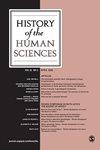“快闪屋”:19世纪伦敦道德传染的公共住宅和地理
IF 0.5
2区 历史学
Q2 HISTORY & PHILOSOPHY OF SCIENCE
引用次数: 0
摘要
“快闪屋”是一种与犯罪活动有关的独特类型的公共住宅,是19世纪初伦敦的一个阴暗面,很少被研究。本文将快闪屋置于一个广阔的视野中,认为关于快闪屋的论述是对城市环境对其居民道德品质威胁的担忧的一部分。这篇文章引用了一系列参考资料的原始综合,包括当代文学、报纸、法庭文件和政府文件。这表明,由于据称警察经常光顾快闪店收集犯罪信息,因此快闪店既是人们对所谓的“黑社会犯罪”的普遍阴谋,也是官方对警察与犯罪嫌疑人勾结的担忧的一部分。对这个词的详细研究揭示了对大都市状况、贫困和犯罪的焦虑,这些都是19世纪初意识的核心。然而,在这种背景下对快闪屋的讨论也表明,在当代人的心目中,城市的物理空间与其对居民道德构成的风险之间存在着强大的联系。虽然物质环境和道德之间的联系在历史上一直存在,但快闪馆代表了这场对话中的一个典型时刻。这是因为在关于快闪店的讨论中,不同的道德问题交织在一起:对黑社会犯罪的焦虑,经常光顾这些场所的年轻人道德败坏的可能性,以及警察通过与已知或疑似罪犯接触而腐败。本文章由计算机程序翻译,如有差异,请以英文原文为准。
‘Flash houses’: Public houses and geographies of moral contagion in 19th-century London
‘Flash houses’, a distinctive type of public house associated with criminal activity, are a shadowy and little-studied aspect of early 19th-century London. This article situates flash houses within a wide perspective, arguing that the discourses on flash houses were part of concerns about the threat of the urban environment to the moral character of its inhabitants. The article draws on an original synthesis of a range of sources that refer to flash houses, including contemporary literature, newspapers, court documents, and government papers. It demonstrates that flash houses were part of both popular intrigue about the perceived ‘criminal underworld’ and official concerns about the collusion between police officers and suspected offenders, since police officers allegedly frequented flash houses to gather criminal information. A detailed examination of this term reveals anxieties about the state of the metropolis, poverty, and criminality that were central to the early 19th-century consciousness. However, the discussion of flash houses in this context also demonstrates a powerful connection in contemporary minds between the physical spaces of the city and the risks that they posed to inhabitants' morals. While associations between the physical environment and morality have been drawn throughout history, flash houses represent a paradigmatic moment in this dialogue. This is because different moral concerns coalesced around the discourse on flash houses: anxieties about the criminal underworld, the potential for moral degradation of young people who frequented these spaces, and the corruption of police officers through contact with known or suspected offenders.
求助全文
通过发布文献求助,成功后即可免费获取论文全文。
去求助
来源期刊

History of the Human Sciences
综合性期刊-科学史与科学哲学
CiteScore
1.60
自引率
11.10%
发文量
31
审稿时长
>12 weeks
期刊介绍:
History of the Human Sciences aims to expand our understanding of the human world through a broad interdisciplinary approach. The journal will bring you critical articles from sociology, psychology, anthropology and politics, and link their interests with those of philosophy, literary criticism, art history, linguistics, psychoanalysis, aesthetics and law.
 求助内容:
求助内容: 应助结果提醒方式:
应助结果提醒方式:


